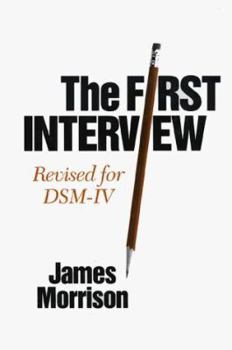The First Interview: Revised for Dsm-IV
Select Format
Select Condition 
Book Overview
This trusted practitioner resource and course text is grounded in James Morrison's experience with more than 15,000 mental health patients. Morrison provides a complete framework for interviewing... This description may be from another edition of this product.
Format:Hardcover
Language:English
ISBN:0898625696
ISBN13:9780898625691
Release Date:November 1994
Publisher:Guilford Publications
Length:317 Pages
Weight:1.40 lbs.
Dimensions:1.3" x 6.3" x 9.3"
Customer Reviews
5 ratings
Greatest Interview Book
Published by Thriftbooks.com User , 16 years ago
This book is a WONDERFUL reference for doing interviews in a school, psychological or professional setting. This book gives examples of how to give a detailed interview, how to ask difficult questions, how to approach clients. I will be using this book for years to come. It was made to accompany the DSM-IV, but even if you don't use the DSM, this book will definitely give you insight as to how to ask inquiries of your client. I use this book constantly, as an M.A. counseling student, and I know that I will be using it in the future as well. If you have any doubts on how to conduct an interview, this is the book to get. I guarantee that you will find this book invaluable.
Great addition to DSM -IV
Published by Thriftbooks.com User , 17 years ago
As a student, this book is great for using when studying how to interview and work in the DSM IV. Lots of valuable information and great reference charts. Worth is to have on hand.
Very useful
Published by Thriftbooks.com User , 18 years ago
I purchased this book for a psychology class and I found it easy to read and easy to implement the suggestions offered within the book.
Excellent, practical methodology
Published by Thriftbooks.com User , 18 years ago
this book is very well-organized and easy to read. it is comprehensive and thoroughly addresses all the possible components to an intake interview that one could imagine! sections of particular interest to me were how to address sensitive subjects and how to get patients to get in touch with feelings (people are often too much in their heads), mental status exam aspects, signs and symptoms, and dealing with difficult patients (lying, hostility, etc.). also useful was information on presenting findings once all the data gathering is done. great resource for students just getting started in the field of behavioral health, as well as medical students assessing potential psychological aspects to a patient's presentation and the need for a referral to a behavioral health practitioner. also helpful when creating documents, such as during the transition to private practice or an administrative position responsible for organization of information/compliance with professional evaluation standards, especially with increasing pressure from accrediting agencies....in other words, a great resource for ALL clinicians!
Written by a great academic teacher
Published by Thriftbooks.com User , 18 years ago
A wonderful book! I have an MA in Psychology (and a PhD in an unrelated field) and have been working in emergency psychiatric evaluations for two years now. This is the one most helpful book that I have found on the question: How do I talk to a person for one hour and know what's going on with them psychiatrically? What I like about it: a) It guides you through the phases of an interview: opening; developing rapport; finding out the client's/patient's chief concern; enquiring about necessary background information, such as psychiatric, social, medical history; current mental status; closure. In what order to cover these topics, which questions to ask, how to ask them, how to pace the interview. b) It fills you in on the main diagnostic signs and symptoms of the major psychiatric disorders. (If you know them already, it is a great refresher.) c) There is a chapter about how to write the diagnosis, such as "diagnostic hierarchies" in case of more than one applicable diagnosis or when there is a number of possible diagnoses you are not sure about. [This will also help you read other people's diagnosis better.] Then a chapter about recommendations and prognoses. d) Two chapters are about dealing with resistance and in other ways difficult clients. e) It is written for a student who learns to do psychiatric interviewing. [The title, "The first interview" is indeed a double entendre, referring to the first interview of a patient/client *and* to your, the reader's, first interview(s).] Thus, it talks about the interviewer's problem with himself/herself, one's own insecurities, feelings, shame, and the techniques available to manage the interviewing relationship itself (such as, e.g., keeping boundaries without appearing callous). The book ends with a list of the most important DSM-IV diagnostic criteria, a sample interview, and a sample written report. It has an annotated bibliography (i.e. a list of books with comments that the author recommends for further reading) and and index. The best I saved for last: This author can write well! It is obvious that he likes his students (in this case you, the reader) and his patients. The author has humor that is never denigrating. This attitude is contageous, it warmed my heart and helped me like my patients. Thus, the book is a pleasure to read. Never dry. In my case, the question was not if I *had* to read the next chapter, but *when* I would have the time to do so. And all this not in a book about feel-good, "it's good that we talked about it" psychotherapy, but in a book covering a chapter in the field of "hard core" psychiatry. Enjoy!




